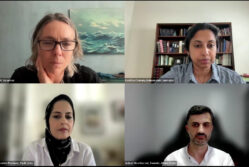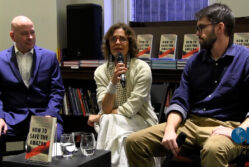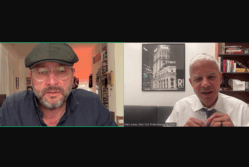Event Coverage Highlight

Panelists Discuss Security, Privacy and Intelligence Gaps
Michael Isikoff
|
Daniel Klaidman
|
Terrorist groups are using more sophisticated tools than ever before to carry out attacks and recruit supporters via social media campaigns. Using encrypted communication and new mobile message platforms like WhatsApp and Telegram, terrorists such as those who planned the November 2015 attacks in Paris have left law enforcement groping in the dark.
On March 2, the OPC and New York University’s Center for Global Affairs co-hosted a panel to discuss recent intelligence failures and the increasing tension between security and privacy.
In an interview with Michael Isikoff, chief investigative correspondent for Yahoo News, National Security Agency Director Michael Rogers confirmed that the terrorists in Paris used encrypted communications to dodge surveillance.
The panelists discussed the pitched battle between Apple and the Federal Bureau of Investigation over access to contacts and other data on a cell phone from one of the suspects in the San Bernardino attack in December 2015.
“This is really an inflection point,” said Daniel Klaidman, OPC governor and Yahoo News deputy editor who has covered the FBI for much of his career.
The FBI demanded that Apple develop software to help them unlock the device, but Apple refused and has invoked free speech and public privacy rights in its defense.
The panelists said both sides were using the case for their own larger agendas. Calls to and from the phone are already available to investigators through metadata, Isikoff said. “The basic idea that the FBI needs this phone unlocked to find out whether there was a co-conspirator really doesn’t hold up to the evidence.”
He added that instead of leaving the decision to Congress, the FBI would prefer to bring the case to court to establish legal precedent that would favor law enforcement down the road.
The National Security Agency’s perspective, Isikoff said, is more sympathetic to Apple.
“Encryption is a very important part of our cyber defenses, and the more you might open the door to a weakening of encryption, so that the FBI and law enforcement can get into phones, you’re also opening the door for foreign hackers and foreign intelligence agencies to get the same information,” he said.
Klaidman said tensions between free expression and security are also playing out in social media. The US government has pressured platforms like Twitter and Facebook to police their sites and block propaganda from groups like ISIS.
Klaidman cited an incident where Twitter, reluctant to be seen as cooperating with the government, refused to return calls to the chief homeland security advisor for the White House.
He said ISIS has gotten sophisticated in its manipulation of security rules for its own aims. The terrorist network invoked terms of service agreements to get graphic anti-ISIS videos made by the State Department taken down from Twitter and YouTube – because the government ran afoul of the platforms’ rules banning violent content.
“It’s basically like Ju-Jitsu, using our strengths against us,” Klaidman said. “Which al-Qaeda also did by using our openness and our technology to attack us on 9-11.”
Alexis Gelber, former OPC president and longtime top editor at Newsweek who moderated the discussion, asked the panelists to address Hillary Clinton’s use of private email servers for communication while serving as Secretary of State.
Isikoff said FBI Director James Comey indicated in a recent press conference that he was getting “briefed regularly” on the case – a sign that investigators could be gathering evidence.
“I think there is a reasonable chance, based on what we know, that the FBI has something here,” Isikoff said.
He said while criminal charges for Clinton were probably unlikely, some of her senior aides who wrote emails on a classified server could face charges of mishandling classified information. Isikoff said that, as recently reported by Reuters, the language used in some emails was similar to that of classified intelligence reports.
“Which means, if you follow the logic, that some people were reading intelligence reports on the classified system, and then laundering them, or writing a sanitized version with the same language on the unclassified system.”



